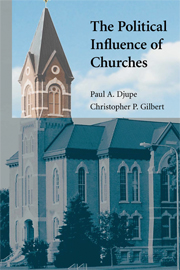Book contents
- Frontmatter
- Contents
- Acknowledgments
- Introduction: A Theory of Religious Influence on Political Behavior
- 1 Social Networks and Church Structure
- 2 Clergy Influences and Religious Commitment Reconsidered
- 3 Church-Centered Influences on Public Opinion
- 4 The Resourceful Believer
- 5 The Construction of Political Mobilization in Churches
- 6 Present but Not Accounted for?
- 7 Conclusion
- Appendix: Variable Coding
- References
- Index
Appendix: Variable Coding
Published online by Cambridge University Press: 05 June 2012
- Frontmatter
- Contents
- Acknowledgments
- Introduction: A Theory of Religious Influence on Political Behavior
- 1 Social Networks and Church Structure
- 2 Clergy Influences and Religious Commitment Reconsidered
- 3 Church-Centered Influences on Public Opinion
- 4 The Resourceful Believer
- 5 The Construction of Political Mobilization in Churches
- 6 Present but Not Accounted for?
- 7 Conclusion
- Appendix: Variable Coding
- References
- Index
Summary
Note: Variables are listed in alphabetical order.
Adult education involvement “In the past year, have you attended any church adult education groups held about one of the following topics?” Twelve topics listed: hunger and poverty, full communion with Episcopalians, women's issues, environment, gay rights, candidate forums, economy, abortion, gambling, family problems, general government and politics, denominational issues.
Age Measured in years.
Ascribed clergy efficacy “Ministers have great capacity to influence the political and social views of their congregation.” 1 = strongly disagree, 2 = disagree, 3 = not sure/neutral, 4 = agree, 5 = strongly agree.
Brand loyalty Is an index composed of summed responses of “yes” (= 1) to “Were you raised in a Lutheran/Episcopal church?”, and “no” (= 1) to the following questions: “Have you ever regularly attended a NON-Lutheran/Episcopal church?” and “Have you ever stopped attending any church for more than six months?” Responses are then averaged, meaning a range of 0 to 1, with 1 indicating high brand loyalty.
Christian Coalition evaluation “How positive or negative do you feel about the groups listed below? The Christian Coalition (Pat Robertson).” 1 = very positive, 2 = positive, 3 = neutral, 4 = negative, 5 = very negative.
Church activity isolation (clergy data) Index measure; the index gains one point if the clergyperson's congregation was less involved in the community, had a lower social status, or was less active in politics than were other community churches. Index is averaged to account for not all clergy answering all questions.
- Type
- Chapter
- Information
- The Political Influence of Churches , pp. 253 - 262Publisher: Cambridge University PressPrint publication year: 2008

